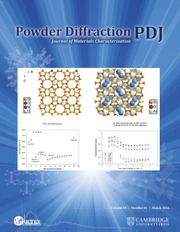Article contents
Crystal structure of levocetirizine dihydrochloride Form I, C21H27ClN2O3Cl2
Published online by Cambridge University Press: 20 April 2021
Abstract
The crystal structure of levocetirizine dihydrochloride Form I has been solved and refined using synchrotron X-ray powder diffraction data and optimized using density functional techniques. Levocetirizine dihydrochloride Form I apparently crystallizes in space group P21/n (#14) with a = 24.1318(21), b = 7.07606(9), c = 13.5205(7) Å, β = 97.9803(4)°, V = 2286.38(12) Å3, and Z = 4. The crystal structure consists of interleaved double columns of cations and anions along the short b-axis. The hydrogen bonds link the cations and anions along this axis. Each protonated nitrogen atom forms a strong N–H⋯Cl hydrogen bond to one of the chloride anions. The carboxylic acid group also forms an H-bond to Cl56, resulting in a ring with a graph set R1,2(10). The centrosymmetric P21/n model for the crystal structure of levocetirizine dihydrochloride is better than the non-centrosymmetric P21 model, even though levocetirizine is a chiral molecule; the sample exhibits weak second-harmonic generation, and three weak peaks which violate the glide plane are observed. The centrosymmetric model is better by statistical, graphical, and energetic measures, as well as by chemical reasonableness. To accommodate the chiral molecule in a centrosymmetric space group, the chiral central carbon atom was disordered over two half-occupied positions, so that each cation site could be occupied by a cation of the correct chirality. A powder pattern from a Le Bail extraction of this synchrotron data set is included in the Powder Diffraction File™ as entry 00-066-1627.
Keywords
- Type
- New Diffraction Data
- Information
- Copyright
- Copyright © The Author(s), 2021. Published by Cambridge University Press on behalf of International Centre for Diffraction Data
References
- 2
- Cited by



